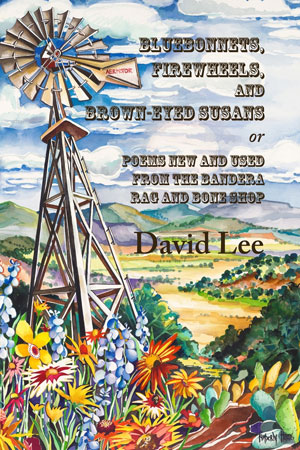Combine the sensibilities of a religious fundamentalist with a free-thinker and what you’ll likely get is an oxymoron, but burnish that hybrid with a poet and you get David Lee, a writer who has been publishing memorable volumes since his 1974 classic, The Porcine Legacy.
In his most recent release, Bluebonnets, Firewheels, and Brown-Eyed Susans (Wings Press, 2017), readers are handed a bouquet of freshly picked and perennial poems rooted in the soil of Lee’s childhood remembrances, though simple nostalgia is not the tenor of these hard-hitting portrayals of rural Texas life. You will laugh out loud and then, perhaps, lower your eyes, having glimpsed not what is right but what is true about human nature.
 David Lee is both poet and storyteller. His new book reads like an anthology of the craziest incidents ever compiled, inspired tales of “women from small town West Texas, 1948-1962.” It’s a tribute to those strong women who shaped Lee’s adolescent brain into a genuine and brilliant custodian of the word.
David Lee is both poet and storyteller. His new book reads like an anthology of the craziest incidents ever compiled, inspired tales of “women from small town West Texas, 1948-1962.” It’s a tribute to those strong women who shaped Lee’s adolescent brain into a genuine and brilliant custodian of the word.
Much of the pleasure in reading Lee’s poetry comes from his scrupulous attention to crafting each page for the ear, saturating his characters in broad washes of rural dialect and dialogue, which he electrifies with humorous pronunciations and innuendo. Witness, for instance, the dilemma of a terrified deputy and his “cuddin” Leroy trying to decide how to get a six-foot snake down from the top on “Mizrez” Birchwood’s drapes:
Could be a giant coppermouf
I dunno
it’s one damn big snaik…
mebbe one them amaconda
crawl up through the sewerpipe
bite wormens on the butt
It’s impossible not to snicker at the two men, the deputy with his pistol drawn shaking in his boots, ready to shoot the “snick” while Susan Butterfield calmly but clearly repeats, “Don’t you shoot that gun in here” at least seven times throughout the 12-page poem, her edict the most lethal force in the room.
The hypocrisy embedded in social norms and religious conventions becomes a lightning rod for Lee, and he strikes with subtle but deadly force. The characters populating these pages are all from the same small town, the preachers, the police, farmers and housewives, children and grandparents. They’re family, all of them. They embody what we’ve seen in the world too, as Lee magnifies their antics and illuminates (like a child with a hand lens) their souls.
Biblical allusions and illusions: the fulcrum upon which Lee’s paradise is supported and his poetic license is regained. A product of his upbringing, experience as a seminary student, or lucky leftover from his pursuit of a Ph.D with a John Milton emphasis – who cares? – the stories delivered from this pulpy mount continually surprise us with little literary miracles.
Threaded through the entire collection are shorter poems “from the sidebar minutes of the monthly Town Board Meetings” that resemble, very loosely, haiku. But in Lee’s hands we might as well refer to them as Hicku – glimpses of the collective unsophisticated rural wisdom, as in this sidebar titled, “Another Reason Why You Didn’t Want Kristine Thornton To Talk During Town Board Meetings”:
I saw that girl of yours
wearing short shorts downtown yesterday
Deacon Hill
she’s so skinny I told my husband
I couldn’t tell if them were her legs
or if she was riding a chicken
Humor, satire, and awkward social proclivities aside, the book also contains deeper pools, quiet places like verbal ponds that reflect perfect imagery, as in this description of a woman, slowly dying:
…above where she lay in the body length embrace
of death, wash hung stretched out and starched
on the clothesline like a flock of angels
nesting in rows under a fading daylight moon
the cheatgrass whitewashed with hard rime
David Lee knows how to pick ‘em — the words, I mean. Bluebonnets, Firewheels, and Brown-Eyed Susans is a paper posy waiting to be passed on to you.

